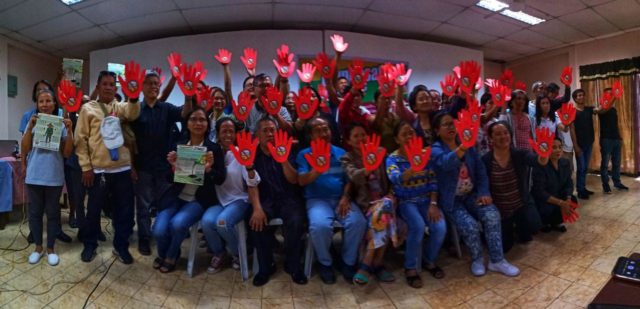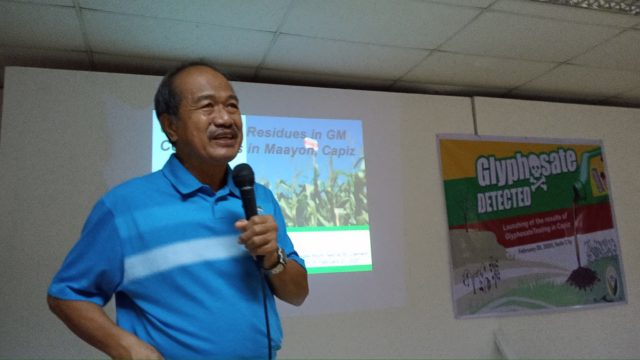Masipag, 20 February 2020 | Source
Farmers, scientists, food right advocates including key government officials from different parts of the Philippines call to ban Glyphosate and hold Monsanto-Bayer accountable to the impacts of Glyphosate to health, environment and livelihoods
PRESS RELEASE
Iloilo City – Farmer scientist group MASIPAG today have raised alarm over findings on the presence and persistence of Glyphosate in a GM corn farming community in Guinbialan, a small village in the town of Maayon, Capiz. Glyphosate, the world’s best selling herbicide, has been used extensively to suppress or destroy unwanted weeds and is used in tandem with herbicide-tolerant GM corn such as Roundup Ready (RR) Corn by Monsanto. According to the 2012 study by MASIPAG, Glyphosate usage in the country amounts to almost 5.3 million liters in one season of GM corn farming in 2011 alone. Glyphosate is also widely-used among major crops such as rice, corn and plantation crops such as sugarcane, palm oil, banana, pineapples, coffee, rubber and also cash crops such as vegetables. The Philippines Fertilizers and Pesticides Authority (FPA) lists more than 70 glyphosate products marketed in the country.
In 2015, however, the World Health Organization’s (WHO) International Agency for Research on Cancer (IARC) classified the weed-killer as “probably carcinogenic to humans.” This pronouncement came at the heels of the various studies that were conducted whose results point to the negative effects of glyphosate. In 2018, Bayer (who now owns Monsanto after the historic merging in 2017) has been sued by victims of glyphosate. In August 2018, the San Francisco Superior Court jurors ruled in favour of Dewayne Johnson, a 42-year-old school groundskeeper suffering from Non-Hodgkin lymphoma. According to the Environmental Working Group, more than 13,000 similar lawsuits have been filed against Bayer.

Study results
These information prompted farmer scientist group MASIPAG to study the presence and persistence of Glyphosate among GM corn farming communities, with Brgy. Guinbialan as focus study area. Farmers in Guinbialan have been using RR corn for more than 10 years, making them one of the earlier adopters of the technology. Initial documentation on the effects of the use of GM corn and glyphosate indicates that there are indeed alarming health and environmental effects. There has been no post-release monitoring conducted by the Dept. of Agriculture or other relevant agencies to date, to sufficiently investigate the impacts of GM corn.
Water, soil and corn kernels were taken from different sites in the community prior, during and post planting and harvesting of GM herbicide-tolerant corn. Glyphosate residues were also tested in the human urine samples during the first sampling. Three farmers volunteered and signed the free and prior informed consent (FPIC) before the obtaining their urine samples. On the course of the sampling process community representatives were involved from collecting the samples to the actual sampling, to engage the community in generating data thru citizen science research.
Of the three tests done in water and soil samples using the Abraxis Glyphosate strip test*, all resulted positive on the presence of Glyphosate. Glyphosate presence was detected among harvested and fresh corn kernel samples. Glyphosate was also detected among urine samples of three farmers.

MASIPAG Member Scientist Dr. Chito Medina, presents the study results of the Glyphosate study in Guinbialan, Maayon, Capiz.
Farmers, sectors call banning of Glyphosate and make Monsanto-Bayer accountable
The glyphosate strip test is simply meant to detect the presence of glyphosate in the soil and water. However, due to the ill effects associated with Glyphosate, the confirmation of the presence of the herbicide in soil, water, urine and corn kernels exposes the community to possible problems and should be of serious concern.
Environmental scientist Dr Chito Medina, who led the said tests, shared about the potential effects of the persistence of Glyphosate in the environment. “Glyphosate presence can affect the soil ecosystem, such as microbial balance and the uptake of important nutrients needed by crops. Studies also show that it takes about four up to 180 days before Glyphosate degrades. As such, Glyphosate presence can be seen in the whole cropping season. Glyphosate presence in water samples indicate contamination of water sources used by the community for drinking and everyday use” said Medina.
“The use of glyphosate formulations was found to induce DNA damage and has been associated with increased risk of cancer especially non-Hodgkin’s lymphoma, neurobehavioral disorders in children and birth defects and other diseases” said Dr Romeo Quijano, a UP Manila College of Medicine retired professor specializing in toxicology and chairperson of the Pesticide Action Network Asia Pacific. Dr Quijano furthered that “Glyphosate is included in Pesticide Action Network‘s (PAN) List of Highly Hazardous Pesticides targeted for global phase-out. The PAN monographs detail glyphosate’s adverse effects on humans, ecosystem functioning, pollination services, biological controls, soil fertility and crop health. PAN has strongly urged governments to adopt agroecological approaches to pest/weed management”.
Jennifer Guste, researcher of IBON foundation pointed out the influence of huge corporations on agricultural policies and plans. “Corporate domination of agriculture leaves farmers with few choices and high costs of inputs. The integration and monopoly of corporations, such as Monsanto-Bayer, aggravates the whole chain of food production, from seeds and raw materials to the market. The influence of these wealthy corporations makes them almost invincible to liability and redress, and thus must be countered”.
Farmers and sectors present are urging the local government and the relevant government agencies, particularly the Bureau of Plant Industry and the Dept. of Agriculture, Dept. of Environment and Natural Resources and the Dept of Health to conduct systematic studies of health and environmental impacts on glyphosate-using farming communities. Local government units and the DA are also called to support farmers to convert to alternative agricultural systems, providing production support for those who are shifting to non-GM corn farming, including providing non-GM corn seeds and promotion of diversified farming.
“We are calling the government to ban Glyphosate, and with it the use of herbicide-tolerant GM corn. Monsanto-Bayer, the producers of Glyphosate should likewise answer to the people who were affected by their product” said Cristino Panerio, National Coordinator of MASIPAG. “The government should enact stringent liability and redress mechanisms to exact responsibility and accountability from the herbicide producers, including just compensation mechanism for the glyphosate-affected farmers and communities” added Panerio.
MASIPAG is a nework of farmers’ groups, scientist and non-government organizations in the Philippines seeking to improve the farmers’ quality of life through their control over genetic resources, agricultural technology and associated knowledge.
For inquiries please contact:
Cristino Panerio, National Coordinator 0917 5640873, (049) 5365549
Email: advocacy@masipag.org, info@masipag.org
*NOTE: The Abraxis Glyphosate Strip Test, a rapid immunochormatographic strip test was used to detect glyphosate in water and food samples. According to its manufacturer, Abraxis, the strip test is used in qualitative screening of glyphosate with a detection range of 2.5 parts per billion (ppb) up to 100 ppb.
